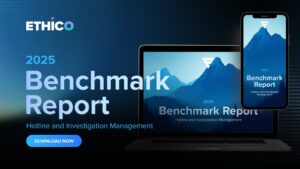Drop the Word, Not the Work: Why DEI is Still Essential 🎨🦾


Full Episode Available
WATCH ON-DEMANDIn an era where the acronym ‘DEI’ has become a political lightning rod, ethics and compliance professionals face a critical choice: abandon important work due to terminology challenges, or find new ways to advance fairness and inclusion that transcend political divides. By examining both the challenges of current DEI implementation and the undeniable benefits of inclusive cultures, this session provided practical guidance for professionals seeking to build cultures of integrity regardless of terminology or political perspective.
This episode of The Ethicsverse examined the current state of Diversity, Equity, and Inclusion work in organizational settings, particularly in light of recent political polarization and executive orders affecting DEI initiatives. Drawing on anthropological and psychological frameworks, the discussion explored how unconscious bias manifests in workplace settings and offered evidence-based approaches to creating truly inclusive environments. The session distinguished between performative “clip art diversity” and authentic inclusion that unlocks employee potential and drives business results. Particular emphasis was placed on the importance of calling people “in” rather than calling them “out,” recognizing that inclusion is not a zero-sum game, and understanding that organizational cultures thrive when all voices are heard. The presenters suggested ways to reframe DEI concepts to maintain focus on fairness and belonging while navigating political sensitivities, ultimately arguing that the work of creating inclusive workplaces remains essential regardless of terminology.
- Michael Baran, Chief Executive Officer, Iris Inclusion
- Nick Gallo, Chief Servant & Co-CEO, Ethico
Beyond Political Divisions
- The polarization around DEI terminology should not distract from the universal values that underpin this work.
- When we remove the acronym and focus on the fundamental principles of fairness, respect, and belonging, most people—regardless of political affiliation—agree on the importance of workplaces where everyone can contribute their unique gifts.
- The challenge lies not in the core values but in how these concepts are communicated and implemented in ways that bring people together rather than creating division.
Distinguishing Performative from Transformative
- Many organizations have fallen into the trap of “clip art diversity”—a superficial, performative approach that focuses on appearances rather than substantive change.
- True diversity work goes beyond demographic representation to create environments where diverse perspectives are genuinely valued and can influence organizational decisions and direction.
- When DEI work becomes merely performative, it fails to achieve its intended purpose and may even generate resistance that undermines legitimate inclusion efforts.
Understanding Unconscious Bias
- Unconscious bias affects everyone, regardless of their intentions or conscious beliefs about equality.
- Research consistently demonstrates that even well-intentioned people harbor implicit biases that influence their decisions and interactions, as exemplified in studies of orchestra auditions where gender bias was only eliminated through blind auditions.
- Acknowledging that bias is a universal human trait rather than a moral failing allows organizations to implement practical solutions that mitigate its effects without alienating team members.
The Business Case for Inclusion
- Creating inclusive workplaces delivers substantial benefits to organizational performance and employee engagement.
- When employees feel safe to express their views and valued for their unique contributions, they are more likely to fully engage with their work, resulting in lower turnover, higher productivity, and more innovation.
- The correlation between inclusive cultures and business results provides a compelling rationale for this work that transcends political considerations and appeals to organizational self-interest.
Calling In vs. Calling Out
- Effective DEI work requires bringing everyone into the conversation rather than excluding or shaming those who may be resistant or uninformed.
- The approach of “calling in” creates dialogue and understanding, while “calling out” often generates defensiveness and resistance.
- By building deep understanding through respectful conversation and education, practitioners can overcome resistance and create allies who support and amplify inclusion efforts throughout the organization.
The Role of Allyship
- Meaningful allyship requires more than symbolic gestures—it demands action, particularly from those with less personal risk in speaking up.
- Those in positions of relative privilege have a responsibility to advocate for colleagues who face exclusion, recognizing that not everyone bears the same risk when challenging the status quo.
- True allies take concrete steps to support colleagues facing exclusion, understanding that performative allyship (using the right language or symbols without taking action) fails to create meaningful change.
Navigating Regulatory Challenges
- Recent executive orders and legal challenges have created uncertainty for DEI practitioners, but have not eliminated the need or legal basis for inclusion work.
- Organizations can continue to remove barriers to participation, implement fair hiring practices, and create inclusive cultures while complying with evolving regulations.
- By focusing on specific, legally defensible practices—such as standardizing interview questions, removing biased language from job descriptions, and ensuring ERGs are open to all—organizations can maintain momentum on inclusion work despite regulatory headwinds.
Reframing the Conversation
- When the terminology becomes polarizing, practitioners can reframe their work around universal values like fairness, respect, and psychological safety.
- By focusing on the outcomes—workplace cultures where everyone can contribute their best—rather than potentially divisive terminology, practitioners can maintain support for inclusion work across political divides.
- This reframing maintains the essence of the work while avoiding unnecessary controversy that might otherwise derail important initiatives.
Measuring What Matters
- Social science provides tools to measure the real impact of inclusion efforts and identify areas where organizations fall short of their aspirations.
- By tracking key metrics related to hiring, promotion, retention, and employee experience, organizations can ensure their inclusion work moves beyond rhetoric to create measurable change.
- This data-driven approach helps demonstrate the continued need for this work and provides evidence of its impact on organizational performance.
Guardianship of Organizational Culture
- Ethics and compliance professionals serve as guardians of organizational culture and have a unique responsibility to advocate for inclusive practices.
- Those drawn to ethics and compliance roles often have a natural affinity for fairness and integrity that aligns perfectly with the core principles of inclusion work.
- By recognizing this alignment and embracing their role as culture stewards, ethics and compliance professionals can help their organizations navigate polarizing issues while maintaining focus on creating workplaces where everyone can thrive.
Closing Summary
In an era of increased polarization around DEI terminology, ethics and compliance professionals have a vital opportunity to refocus attention on the underlying principles that virtually everyone agrees with: fairness, respect, and creating workplaces where all employees can contribute their best. By distinguishing between performative approaches and substantive change, focusing on measurable outcomes rather than terminology, and calling people into conversation rather than calling them out, practitioners can navigate political sensitivities while continuing the essential work of building inclusive cultures. The path forward requires understanding multiple perspectives, reframing conversations around universal values, and demonstrating how inclusive cultures directly contribute to organizational success. When approached thoughtfully, this work transcends political divisions and supports the fundamental mission of ethics and compliance: creating cultures of integrity where businesses and their people can thrive.






































